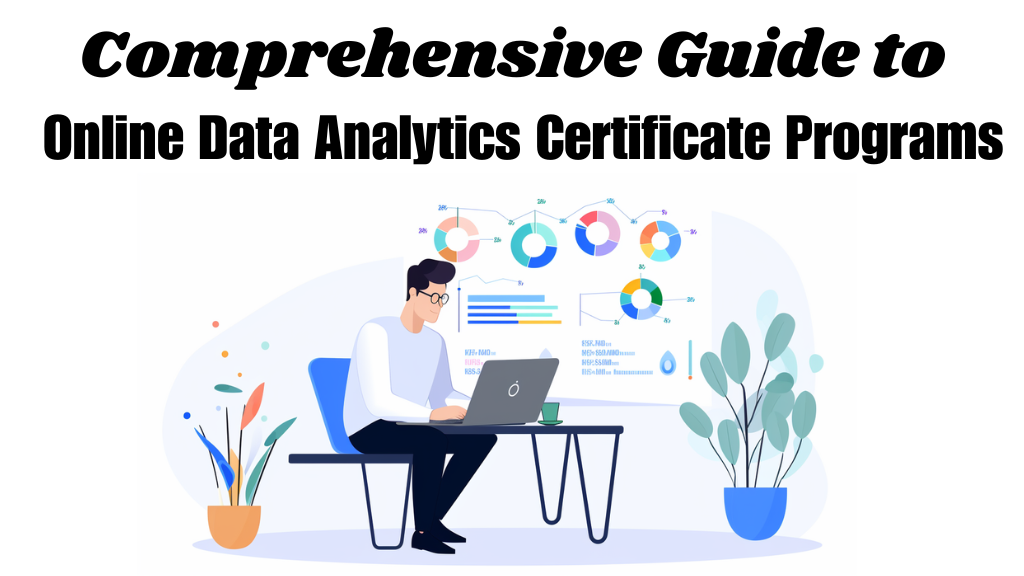I am writing now about Comprehensive Guide to Online Data Analytics Certificate Programs the demand for skilled data analysts has skyrocketed. Businesses across all industries are increasingly relying on data analytics to make informed decisions, optimize operations, and gain a competitive edge. As a result, there is a growing need for professionals who can interpret and analyze data effectively. Online data analytics certificate programs have emerged as a popular pathway for individuals looking to enter this dynamic field or enhance their existing skills.
This comprehensive guide will delve into the world of online data analytics certificate programs, covering everything from their importance and benefits to top programs available and tips for choosing the right one. Whether you’re a beginner seeking to launch a new career or a professional aiming to upskill, this guide will provide valuable insights to help you make an informed decision.
The Importance of Data Analytics
Before exploring certificate programs, it’s essential to understand why data analytics is so crucial in today’s business landscape.
Driving Business Decisions
Data analytics provides organizations with valuable insights that drive strategic decision-making. By analyzing data, businesses can identify trends, predict future outcomes, and make data-driven decisions that improve efficiency and profitability.
Enhancing Customer Experience
Understanding customer behavior is key to delivering personalized experiences. Data analytics helps businesses track customer interactions, preferences, and feedback, enabling them to tailor their products and services to meet customer needs better.
Optimizing Operations
Operational efficiency is critical for any organization. Data analytics helps in identifying bottlenecks, optimizing supply chains, and improving overall operational processes, leading to cost savings and increased productivity.
Competitive Advantage
Companies that leverage data analytics effectively can gain a significant competitive advantage. By staying ahead of market trends and making informed decisions, businesses can outpace their competitors and capture a larger market share.
Benefits of Online Data Analytics Certificate Programs
Online data analytics certificate programs offer numerous benefits, making them an attractive option for individuals seeking to build or enhance their skills in this field.
Flexibility and Convenience
One of the primary advantages of online programs is flexibility. Students can access course materials, lectures, and assignments at their own pace, allowing them to balance their studies with work and other commitments.
Cost-Effective
Online programs are often more affordable than traditional in-person courses. They eliminate the need for commuting and other associated costs, making education more accessible to a wider audience.
Access to Top Institutions
Many prestigious universities and institutions offer online data analytics certificate programs. This provides students with the opportunity to learn from top educators and industry experts without having to relocate.
Hands-On Experience
Many online programs include practical, hands-on projects that allow students to apply their knowledge in real-world scenarios. This practical experience is invaluable for building a strong portfolio and gaining confidence in using data analytics tools and techniques.
Networking Opportunities
Online programs often have forums, group projects, and virtual events that facilitate networking with peers, instructors, and industry professionals. Building a professional network can open doors to job opportunities and collaborations.
Top Online Data Analytics Certificate Programs
There are numerous online data analytics certificate programs available, each offering unique features and benefits. Below are some of the top programs recognized for their quality and comprehensiveness.
Google Data Analytics Professional Certificate
- Institution: Google via Coursera
- Duration: 6 months (at 10 hours per week)
- Overview: This program covers data cleaning, analysis, visualization, and programming in SQL, R, and Tableau. It includes hands-on projects to build practical skills.
- Cost: Approximately $39 per month (financial aid available)
- Benefits: No prior experience required, self-paced learning, and recognized by employers globally.
IBM Data Analyst Professional Certificate
- Institution: IBM via Coursera
- Duration: 3-6 months (at 10 hours per week)
- Overview: Covers data analysis tools such as Excel, Python, and SQL, along with data visualization techniques. Includes practical projects and a capstone project.
- Cost: Approximately $39 per month (financial aid available)
- Benefits: Industry-recognized, suitable for beginners, hands-on experience with IBM tools.
HarvardX Data Science Professional Certificate
- Institution: Harvard University via edX
- Duration: 9 months (at 2-3 hours per week)
- Overview: A comprehensive program covering R programming, data wrangling, visualization, probability, inference, and modeling. Includes real-world case studies.
- Cost: $792 for the full program (financial aid available)
- Benefits: Prestigious institution, in-depth curriculum, suitable for beginners and intermediate learners.
Microsoft Professional Program in Data Analysis
- Institution: Microsoft via edX
- Duration: 10 weeks (at 4-8 hours per week)
- Overview: Focuses on Microsoft Excel, Power BI, and Azure to teach data analysis, visualization, and machine learning. Includes practical labs and projects.
- Cost: Approximately $99 per course (total cost varies)
- Benefits: Industry-recognized, practical labs, integration with Microsoft tools.
University of California, Irvine (UCI) Data Science Certificate Program
- Institution: UCI Division of Continuing Education
- Duration: 6 months to 1 year
- Overview: Covers data analysis, statistics, programming in R and Python, and data visualization. Includes a capstone project.
- Cost: $3,570
- Benefits: Comprehensive curriculum, flexible scheduling, suitable for working professionals.
Key Components of Data Analytics Certificate Programs
To choose the right data analytics certificate program, it’s important to understand the key components that make up a comprehensive curriculum. These components ensure that students gain a well-rounded education and practical skills applicable to real-world scenarios.
Data Cleaning and Preparation
Data cleaning and preparation are critical steps in the data analysis process. Programs should teach students how to handle missing data, correct errors, and transform raw data into a usable format.
Data Analysis Techniques
Students should learn various data analysis techniques, including descriptive, diagnostic, predictive, and prescriptive analytics. This includes understanding how to interpret and analyze data using statistical methods.
Programming Skills
Proficiency in programming languages such as Python, R, and SQL is essential for data analysts. Certificate programs should include courses that teach these languages and how to use them for data analysis and manipulation.
Data Visualization
Effective data visualization helps in communicating insights clearly and effectively. Programs should cover tools and techniques for creating visualizations using software like Tableau, Power BI, and matplotlib in Python.
Machine Learning and AI
Many advanced data analytics roles require knowledge of machine learning and artificial intelligence. Programs should introduce students to basic machine learning concepts and algorithms, and how they can be applied to data analysis.
Real-World Projects
Hands-on projects and case studies are vital for applying theoretical knowledge in practical scenarios. Programs should include opportunities for students to work on real-world data sets and projects that mimic industry challenges.
Soft Skills
In addition to technical skills, data analysts need strong communication, problem-solving, and critical-thinking skills. Programs should offer training in these areas to prepare students for the collaborative nature of data analytics work.
How to Choose the Right Program
With numerous online data analytics certificate programs available, selecting the right one can be challenging. Here are some factors to consider when making your decision:
Accreditation and Reputation
Choose programs offered by reputable institutions or organizations. Accredited programs ensure a certain level of quality and recognition in the industry.
Curriculum and Specializations
Review the curriculum to ensure it covers the skills and topics relevant to your career goals. Some programs may offer specializations in areas such as business analytics, healthcare analytics, or marketing analytics.
Cost and Financial Aid
Consider the cost of the program and whether financial aid or payment plans are available. Investing in your education is important, but it should also be financially feasible.
Duration and Flexibility
Ensure the program’s duration and schedule align with your availability. Flexible, self-paced programs are ideal for those balancing work and study.
Instructor Expertise
Research the instructors’ backgrounds and expertise. Programs taught by industry professionals and experienced educators provide valuable insights and knowledge.
Student Support and Resources
Look for programs that offer robust student support, including access to mentors, career services, and networking opportunities. These resources can enhance your learning experience and career prospects.
Reviews and Testimonials
Read reviews and testimonials from past students to gauge their experiences and outcomes. Positive feedback and success stories can indicate a program’s effectiveness.
Career Opportunities in Data Analytics
Completing an online data analytics certificate program opens up a wide range of career opportunities. Here are some of the roles you can pursue with the skills gained from these programs:
Data Analyst
Data analysts are responsible for collecting, processing, and performing statistical analyses on data. They interpret data to identify trends and insights that inform business decisions.
Business Analyst
Business analysts focus on improving business processes and systems. They use data analysis to identify areas for improvement and recommend solutions that enhance efficiency and effectiveness.
Data Scientist
Data scientists use advanced analytics, machine learning, and statistical methods to extract insights from complex data sets. They often work on predictive modeling and developing data-driven solutions.
Data Engineer
Data engineers design, build, and maintain data pipelines and databases. They ensure data is accessible, reliable, and optimized for analysis.
Business Intelligence Analyst
Business intelligence analysts develop and maintain BI solutions, including dashboards and reports. They help organizations make data-driven decisions by providing actionable insights.
Marketing Analyst
Marketing analysts use data to evaluate marketing strategies and campaigns. They analyze consumer behavior, market trends, and campaign performance to optimize marketing efforts.
Financial Analyst
Financial analysts analyze financial data to help businesses make investment decisions, manage risks, and optimize financial performance. They often work with financial statements, market trends, and economic data.
Future Trends in Data Analytics
The field of data analytics is continually evolving, with new trends and technologies emerging. Here are some future trends to watch:
Increased Use of AI and Machine Learning
Artificial intelligence and machine learning will continue to play a significant role in data analytics. Advanced algorithms and models will enable more accurate predictions and deeper insights.
Big Data Analytics
The volume of data generated is growing exponentially. Big data analytics will become increasingly important for processing and analyzing large data sets to uncover hidden patterns and trends.
Real-Time Data Analytics
Real-time data analytics allows businesses to make immediate, data-driven decisions. As technology advances, real-time analytics will become more prevalent across industries.
Data Privacy and Security
With the increasing use of data, privacy and security concerns are paramount. Future trends will focus on developing technologies and regulations to protect data and ensure ethical use.
Data Literacy
As data becomes integral to decision-making, data literacy will become a crucial skill for all professionals. Organizations will invest in training employees to understand and use data effectively.
Online data analytics certificate programs provide a flexible, cost-effective, and accessible pathway to gaining the skills needed in today’s data-driven world. By choosing the right program and investing in your education, you can unlock numerous career opportunities and contribute to the growing field of data analytics. Whether you’re a beginner or an experienced professional, these programs offer valuable insights and practical experience to help you succeed in this dynamic industry.


2 thoughts on “Comprehensive Guide to Online Data Analytics Certificate Programs”